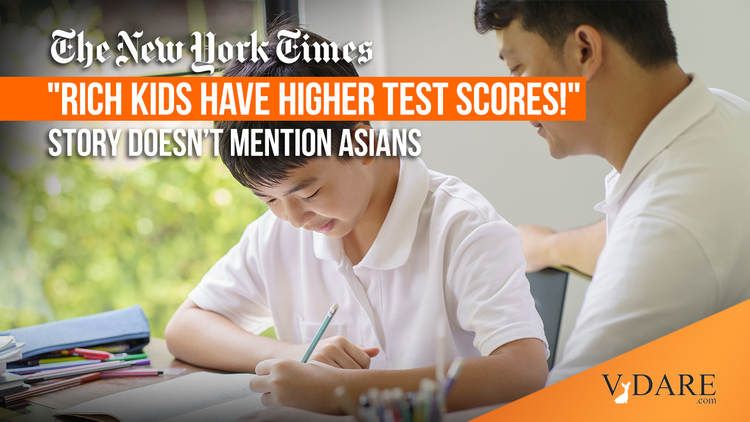


By Steve Sailer
10/24/2023
From The New York Times news section on another paper from the Raj Chetty anonymized data factory:
New SAT Data Highlights the Deep Inequality at the Heart of American Education
By Claire Cain Miller Graphics by Francesca Paris Oct. 23, 2023
… The researchers matched all students’ SAT and ACT scores for 2011, 2013 and 2015 with their parents’ federal income tax records for the prior six years. Their analysis, which also included admissions and attendance records, found that children from very rich families are overrepresented at elite colleges for many reasons, including that admissions offices give them preference. But the test score data highlights a more fundamental reason: When it comes to the types of achievement colleges assess, the children of the rich are simply better prepared.

It’s completely unsurprising that this graph trends upward. But it’s hard to know what to make of how much it trends up. Is that a surprising amount? Has the slope gone up or down over time? I wouldn’t be surprised if rich kids score relatively higher today than 50 years ago (they sure work harder at it than in 1973), but if that is true, we’d still not be sure why.
Strikingly, the Times reporter eventually gets around to inserting a one-sentence admission against interest that it’s not all that the rich can afford better nurture, but that nature matters too:
Although the heritability of cognitive ability appears to play some role on an individual level,
I.e., not on the racial level. (This Chetty study prudently doesn’t break out any data by race.)
there is also a lot of evidence that environment matters.
From @CandideIII
10yr effort by @Steve_Sailer (and others) and finally — finally! — NYT feels that it couldn’t publish an article like this without a nod to heritability. Yes, it’s literally half a sentence, and references are 2x Plomin and adoption-IQ paper from 1989, but …
My advice to reporters writing articles on just about any social science study is to insert a sentence like this one to prevent a lot of easy scoring off you in the comments section.
Anyway, back to the NYT:
In the wake of the Supreme Court decision ending race-based affirmative action, there has been revived political momentum to address the ways in which many colleges favor the children of rich and white families, such as legacy admissions, preferences for private school students, athletic recruitment in certain sports and standardized tests. …
Differences in academic performance by race have shrunk in the last 50 years, Professor Reardon has shown. But Black and Hispanic families are disproportionately likely to live in poor neighborhoods, even compared with white families who earn similar incomes, and their children are more likely to attend high-poverty schools. White families are more likely to live in affluent districts and to choose mostly white schools. Yet it is income segregation, not race, that is the driver of achievement gaps, research shows.
“Black, Hispanic, Native American kids attend lower-income schools,” Professor Owens said. “It’s not that sitting next to a white kid is magical. It’s money in schools.”
“Segregation” is the current code word for when blacks and Hispanics fail to perform well but you still want to blame whites for that: see, the more blacks in a school, the worse the black students do. And that’s the fault of whites for segregating them, not the fault of blacks. As we all know, there is a near infinite supply of white kids in 2023. So, all we have to do is send some of the vast current surplus of white students to schools in black neighborhoods to stop those schools from being segregated.
OK, but here’s a word that’s not mentioned in an article about how affluent parents work to get their kids higher SAT/ACT scores: “Asian.”

Most upper middle class parents in America know that Asians are driving the test prep mania at their child’s school.
But almost nobody seems to know that anymore when the domain shifts from private affairs to public affairs. For example, there are a lot of decent comments, pro and con on this article, but none of the top 10 or 20 liked comments mention the Asian angle. The huge rise in Asian test scores is not something we talk about in respectable discourse, even though it was central to the recent Supreme Court case about affirmative action at Harvard.